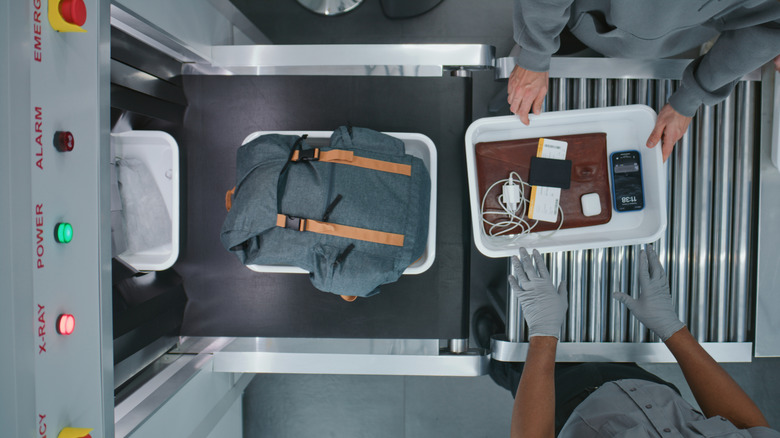
Every day, between two and three million passengers go through the Transportation Security Administration's checkpoints and screenings, principally at airports. And every year, the TSA finds a bunch of
stuff that shouldn't be passing through. Most of the time, it's run-of-the-mill items like harmless liquids or a belt someone forgot to remove. Occasionally, even a poor pet has to endure the security scanner after its owner forgets to take it out.
The TSA's rules are often annoyingly inconsistent depending on the airport. But other times, they find some serious stuff, like guns, ammo, drugs, and knives. To be honest, none of those are surprising. What is surprising is how people attempt to sneak them through to the gate.
Travelers try all sorts of approaches to get things past security. Whether it's hiding drugs in peanut butter, wrapping weapons in foil, or sneaking live animals in their pants, take this as a must-know list of don'ts for going through TSA (even if on the extreme side). Attempting to circumvent procedures is illegal, and there are ways of getting most items on this list onto a plane without breaking the law. It might also save you some online embarrassment when the TSA inevitably makes an example of you by posting your violation on social media.
Read more: The Odd Reasons TSA May Have Pulled You Aside For Additional Screening
Seahorses In A Liquor Bottle

In 2016, the TSA reported that someone had attempted to pass a liquor bottle through the security checkpoint at the Detroit Metropolitan Wayne County Airport. The TSA prohibits liquids in quantities over than 3.4 ounces from passing through the checkpoint, so obviously, the agents flagged the bag with the bottle and detained it for further searches.
Upon closer inspection, agents found that the person transporting the bottle had stashed five dead seahorses inside it. It is unclear what exactly this passenger expected to do with the animals, which were on the endangered species list. In the end, the Michigan Department of Natural Resources confiscated the bottle and the specimens. It is unclear whether the traveler faced civil and criminal charges for smuggling endangered wildlife. Nevertheless, the actions likely ran afoul of the Endangered Species Act, which proscribes fines of up to $62,000 and prison time.
While the TSA did not mention any motives, Israel's YNet found that seahorse smuggling is a multimillion-dollar industry thanks to the animals' use in traditional medicine, especially in East Asia. Given that the specimens were dead, it is possible they were being smuggled for this purpose, although it is not known for certain.
A Cat
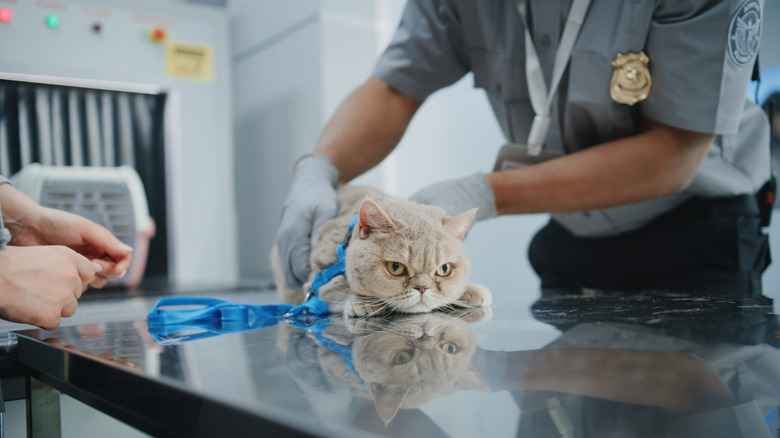
Here's a little hack to help zip through TSA: remember your pet. In 2023, TSA agents were greeted with a fuzzy surprise when they discovered a cat inside a carrier bag that was being passed through the X-ray machine at the airport in Norfolk, Virginia. The cat was fortunately not confiscated and returned to its owner after it turned out that it had all been a mistake on the owner's part.
The offending traveler followed all regulations for carrying small animals aboard a plane till the checkpoint — the pet was in a travel bag and it had been checked in with the airline. However, TSA spokeswoman Lisa Farbstein told CNN that although pets generally should stay inside their carriers while in the airport, they must be removed and either carried or walked on a leash through the security checkpoint. The owner either did not know how to do this or forgot about it.
Farbstein also offered some advice for future travelers with cats. Because cats cannot easily be walked like dogs, it is best that the owner request a screening of the pet and a carrier in a separate room — small animals will often be swab tested to ensure they are not carrying any explosive residue or bombs on their bodies. Otherwise, if a traveler forgets to remove the pet, they have to do security all over. And that can result in a missed flight, especially if you are at one of America's airports with the longest TSA wait times. This was not the first time the agency had dealt with such a situation, as a cat was found in a checked suitcase in 2022 on its way to an Orlando-bound plane. That time, however, the cat was confiscated.
Knives In A Can

In 2024, TSA agents at Houston's George Bush Intercontinental Airport discovered an energy drink can inside a passenger's carry-on. Given outside liquids over 3.4 ounces are prohibited past the checkpoint, the officers naturally flagged the bag for further search and found, as expected, the can — except it was crushed. According to the TSA's Instagram, the agents found two knives and a torch lighter inside the can.
A few things stand out. First of all, it is unclear why the traveler thought it would be a good idea to use, of all things, a drink can — an item that was already banned in the first place — to wrap the items. Even more incredible is that he could have done things legally and kept most of his items without issue. The TSA allows knives in checked luggage as long as they are properly wrapped. What exactly he hoped to use the torch lighter for is unclear; the TSA prohibits anything bigger than a personal lighter in carry-ons.
Once again, the TSA did not mention whether this traveler ended up facing any sort of penalty. If he did, he was probably left with a hole in his wallet bigger than the cost of all the items. Just being in possession of the torch lighter and knives can result in fines of up to $2,570 per item, although first-time violators are given warnings in the latter case. However, deliberately concealing items betrays intent to circumvent or subvert TSA rules, which can lead to far more serious charges than just fines.
A Fake Pipe Bomb

If there is an example of a "don't be like this guy" from the TSA, this is it. In May 2025, TSA agents at Boise Airport in Idaho made a terrifying discovery of what they initially thought was a pipe bomb. It had replica wires, fake C4 explosives, and a detonator attached to it, so much so that officers thought it was the real thing.
In the end, it appears that it was a training aid of some sort, according to the TSA's Instagram account. "We understand some people like to train hard, but this is a blast from the no-no past. Even if it's a training aid, it can be a powder keg of confusion and delays," read a statement from the agency. "And no, saying "It's just a prop!" doesn't defuse the situation." While the passenger carrying this beauty may have gotten away with simply having it confiscated (unclear what consequences they faced), travelers should take the agency's warning seriously; if it looks like the real thing, it will be treated like the real thing.
Per the TSA's enforcement rules, carrying "[r]ealistic replicas of explosives" like the one discovered in Boise can come with civil penalties of up to $4,250 in fines in addition to a criminal referral to the Justice Department. If the DOJ decides to prosecute, such travelers likely will face the Bomb Hoax Statute – 18 USC 35 – which slaps an additional $5,000 fine, five years in prison, or both on the guilty party. And lack of intent to intimidate or cause harm is not a defense. Throw on state charges, federal interference charges, and more, and violators could theoretically be staring at over a decade in prison.
Snakes
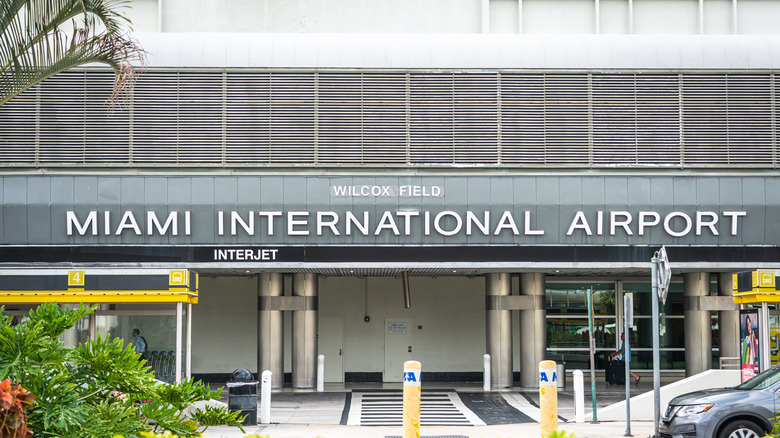
This isn't the movie, although as one X user pointed out, maybe the passenger who got caught intended to do a small-scale remake of the Samuel Jackson movie. In April 2024, TSA agents at Miami International Airport pulled a passenger over something abnormal in his pants. Following a search, they found a camo bag inside, which contained two small pink snakes. The animals were confiscated and turned over to the Florida Fish and Wildlife Conservation Commission, although it is unclear whether the passenger was arrested.
The first question, obviously, is what on earth was this person thinking? However, TSA rules are actually silent regarding what kind of animals are allowed to go through the checkpoint. The TSA website doesn't list appropriate species, just that they must be in appropriate containers. So Thrillist asked the agency for more specifics. The agency responded that it's up to the airline and the individual airport.
Most airlines allow snakes to be checked in the cargo hold. Therefore, this passenger could have avoided the embarrassment by putting the snakes in an appropriate container, traveling with an airline that permitted snakes (usually in the cargo hold), from an airport that permitted snakes, and also declared them. Instead, he chose to do this. The lesson? Always do your research and be transparent about what you need. And don't violate the Endangered Species Act, because hiding stuff in your pants isn't going to work with today's technology.
Vape In Toothpaste
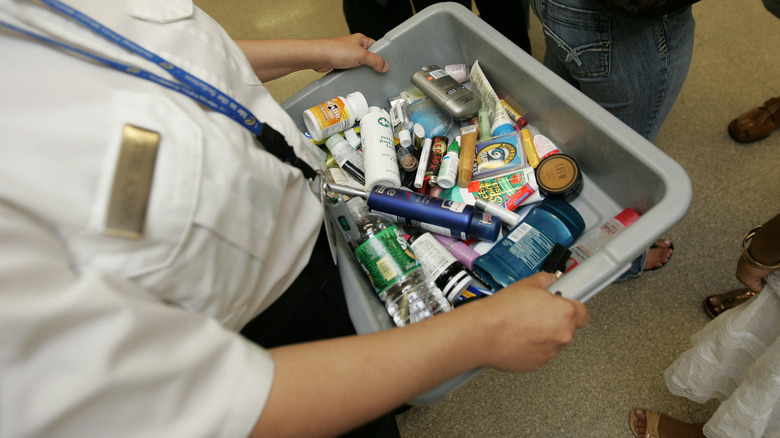
Rule number one of sneaking prohibited items through TSA: when you hide something, make sure the hiding spot isn't something that is already prohibited and will be flagged regardless. This is pretty much what one passenger discovered when TSA officers at Chicago's Midway International Airport discovered a vape pen hidden in a tube of toothpaste.
It is safe to say the offender really did not think this one through. TSA rules already prohibit virtually all outside (that is, purchased outside the secure area) liquids, creams, gels, and pastes over 3.4 ounces. Vape pens are between four to six inches long. This means the toothpaste tube must have been a standard-sized tube of Colgate toothpaste, which is also between 4-6 inches long and contains around 6 ounces of toothpaste — ergo, too much to bring on board. In short, this was never going to work.
The TSA did not mention what happened to the offender, but going by their enforcement rules, it is unlikely the passenger faced any stringent penalties. Attempting to circumvent "a security system, measure, or procedure by the artful concealment of a non-explosive liquid, aerosol, or gel" carries a fine between $160 and $340 per violation. It's not ideal, but it's also not the end of the world. But if you don't want to throw money into the burn pit, don't do stuff like this.
Tinfoil-Wrapped Firearm Components And Ammo
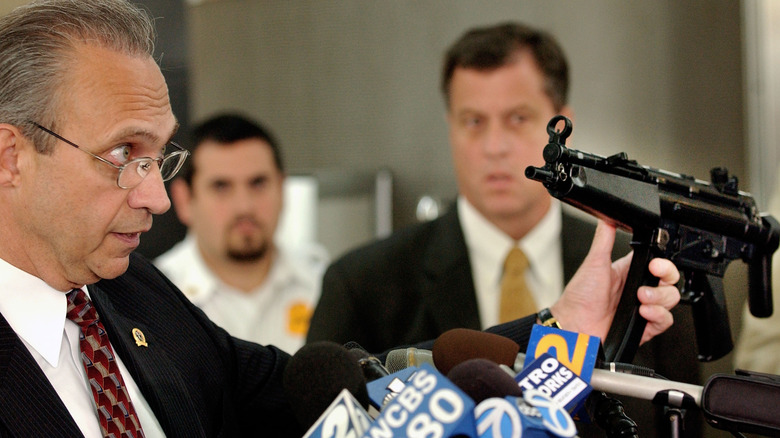
Here is yet another attempt at "artful concealment" (the TSA's words) gone completely wrong. In 2024, TSA officers at Portland International Airport in Oregon spotted a bunch of items that were suspicious to say the least: a teapot, a lot of tin foil, shot glasses, and various other items that seemed like a strange way to sneak something through TSA. Upon unwrapping and closer inspection, the officers found that the passenger had attempted to conceal various firearm parts and ammunition. It is possible the passenger hoped the tin foil and other metal objects would prevent the scanner from seeing what was inside. Sadly for him, not only does this not work, but metal foil is one of those kitchen staples that lead to the TSA inspecting your bag.
Not unlike some of the other incidents, the TSA indicated that police were indeed called to the scene, which makes sense considering the severity of the violation. While the specifics were not released, according to TSA rules, he was likely looking at a fine of up to $12,000 (assuming he's a first-time offender) in addition to a criminal referral that could carry prison time. On top of that, concealment counts as attempting to circumvent TSA procedures, with the sanction depending on the severity of the offense, so it is likely he got hit with additional penalties for that, too. And to top it all off, every single item the passenger was carrying could have been taken onto the plane legally in a checked bag.
Gun In A Baby Stroller
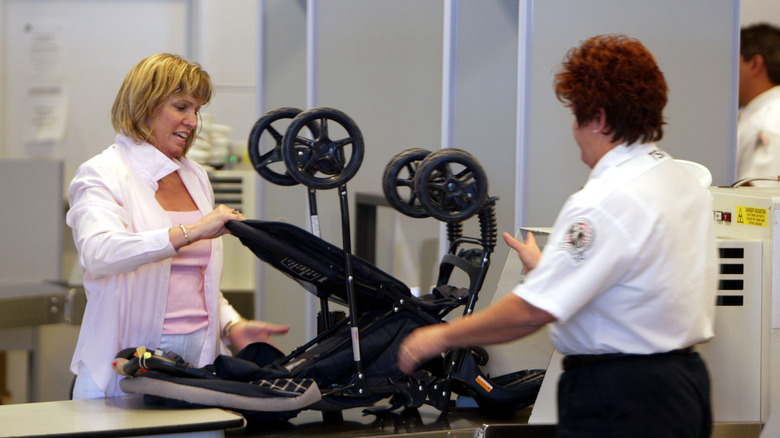
In an incident that made the number 1 spot on the TSA's 2024 list of strangest finds, a man was arrested at Arnold Palmer Regional Airport in West Virginia after agents found a loaded gun in his baby stroller. Local law enforcement arrested the man and charged him with possession of a weapon in a prohibited area. While there was no comment on civil penalties, under TSA rules, he would have faced a fine of up to $12,000, assuming it was his first offence.
When the man was questioned, he said he always carried a gun in the stroller when he and his wife took their child and dog for a walk — a perfectly legal thing to do in West Virginia, which is a permit-less carry state. While it is impossible to ascertain the veracity of the man's statement, things like this have happened before — Houston businessman Farid Seif accidentally brought a loaded pistol onto a plane that TSA did not catch, part of the 70 percent of dangerous items the TSA regularly misses.
The moral of the story is: if you are traveling with any bag or item that you use for storing or carrying firearms, ammunition, or any related paraphernalia, always triple-check to make sure nothing prohibited is in there. Accidental possession is still a crime, and while the penalties might be mitigated, they will still be steep.
Marijuana In Peanut Butter

The TSA catches this one every so often, with the most recent newsworthy incident occurring in 2024. In all of these instances, travelers attempted to sneak marijuana in jars of peanut butter, hoping that the thickness would prevent the TSA scanners from catching it and the strong smell would prevent the agency's dogs from sniffing it. It's a pretty novice way of smuggling the drug — the domain of high schoolers who think they are one-upping Uncle Sam. But given TSA rules, it doesn't work.
In the 2024 case, which occurred at Asheville Regional Airport in North Carolina (or in any of the other instances, for that matter), the offender very clearly had not thought the plan through. The jar of peanut butter is enough to trigger secondary screenings on its own, regardless of whether there are drugs in it. The TSA considers peanut butter as a liquid, making it subject to the 3-1-1 rule (under 3.4 ounces and in a clear plastic bag). Apart from that, although the TSA has no policies on drugs listed on its website, marijuana is still illegal at the federal level.
Airports are federal property; state laws are null and void. Agents will confiscate your stash and refer you to law enforcement for potential prosecution, regardless of whether the weed is medicinal. The TSA Instagram account did, however, note that you can carry your marijuana paraphernalia with you in your checked luggage, as long as you wash it out really well to ensure there is no residue. Do that, and they won't ask any questions, their word.
Explosive Golf Balls
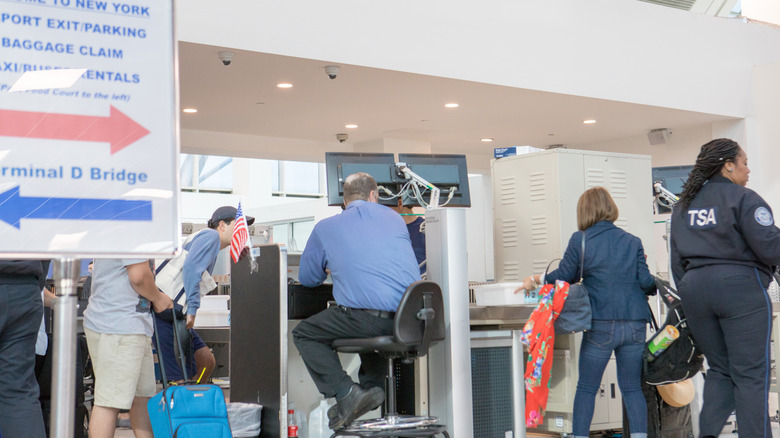
In 2021, TSA agents at LaGuardia Airport noticed that a passenger was carrying golf balls in his carry-on. But upon closer look, the officers realized they were of the exploding variety, with the words "explosive technology" written on the back in all caps, and "explosive impact" written on the front. Such balls are commonly used as pranks on golf courses, exploding in a cloud of colored dust when hit.
The TSA didn't think it was funny, and the balls were promptly confiscated. The agency justified the seizure, noting that under their rules, if the item looks like the real thing or is described as the real thing, it will be treated as such. The offender likely did not face the stiffest of penalties, considering these were probably carried in good faith, not to cause a stir. But under TSA rules, should you find yourself caught with such items, you could face a fine of up to $2,750 and potential criminal charges if you interfere with the TSA's investigation, even by making jokes about the item that the officer may perceive as a threat.
A Turtle
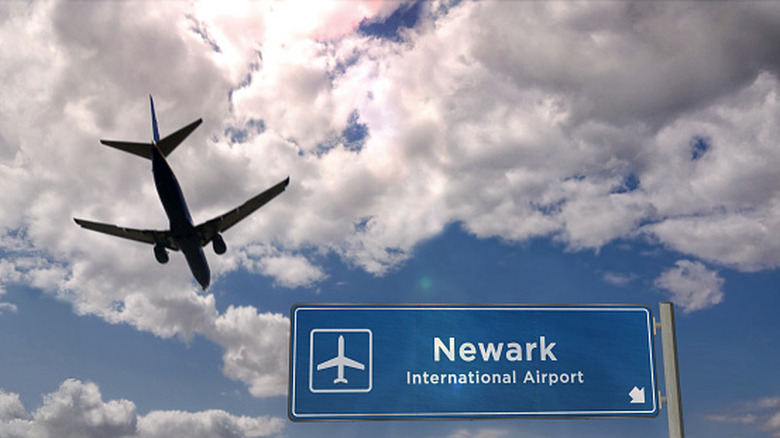
In keeping with the trend of trying to sneak reptiles — otherwise forbidden in the passenger cabin — through security, TSA pulled a man aside in 2025 at Newark-Liberty International Airport in New Jersey over a large object in his groin. The man immediately broke under questioning and confessed to hiding a stowaway in his pants – an invasive red-eared slider turtle, which he promptly pulled out.
Now, one might ask: What in the world was this guy thinking? Why do this? Perhaps the man wanted a pet — the species is extremely common in the U.S. as a pet. But given how common the turtle is in the wild, the offender could've probably found one at a local pond and brought it home without facing the embarrassment of getting caught with it in the TSA line.
Regardless, his plan failed. TSA turned the animal over to the U.S. Fish and Wildlife Service, while the passenger set himself up for some ruthless mockery online. On the comments section on The Gothamist, the top comment read, "I'm ashamed of you all. 17 comments and not a single reference to "a reptile dysfunction"? C'mon, folks. It was right. There." Or another, which went, ""Is that a turtle in your pocket, or are you happy to see me?" Thus, it is safe to say the guy's ego probably got bruised, but at least the turtle was alright.
A Lot Of Tennis Balls
Okay, so this one isn't your typical TSA find. In April 2025, TSA agent Ari — really a K-9 sniffing dog — picked up something suspicious at a gate desk at the airport in Indianapolis. After following the scent, he discovered an abandoned suitcase. In an airport, an abandoned suitcase is a pretty big deal, as passengers are told ad nauseam never to leave their belongings unattended and immediately report any they find.
As it turns out, that suitcase was just a decoy for the dog, who had performed his very last duty on the job. The moment he found the suitcase, TSA agents hidden behind seats showered him with tennis balls as a retirement gift. He then proceeded to run around joyfully chasing the balls as other TSA dogs were given a reprieve from their duties to join in the fun. Just goes to show that not all TSA finds of prohibited or suspicious items end in confiscation, arrests, tears, and insults — sometimes they end in zoomies.
Ready to discover more hidden gems and expert travel tips? Subscribe to our free newsletter for access to the world's best-kept travel secrets.
Read the original article on Islands.












